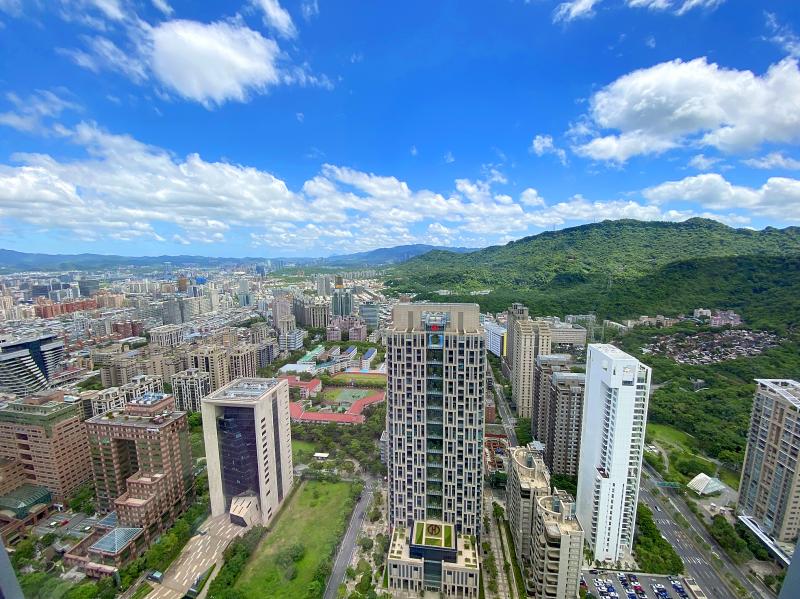More than 60 percent of Taiwanese expect housing prices to climb this quarter, a sharp increase from three months earlier, as concerns about COVID-19 infections drastically subside, a survey by Evertrust Rehouse Co (永慶房屋) found last week.
The rapid increase in the vaccination rate also supported respondents’ confidence in a recovery, said the Taipei-based broker, the largest in Taiwan by number of offices.
Sixty-three percent of respondents were expecting housing prices to increase, up from 42 percent in the second quarter, during which authorities raised the COVID-19 alert to level 3, thereby reducing buying interest for the next few months, Evertrust’s quarterly survey said.

Photo: Hsu Yi-ping, Taipei Times
The government has since late July eased disease prevention measures, it said, adding that people have by and large resumed house hunting.
Nearly 30 percent of respondents said it would be wise to join the market in the second half of this year, while 24 percent said it would be better to take action in the first half of next year.
That suggests that more than 50 percent of people think they should take advantage of the record-low interest rate and sufficient liquidity caused by a stable economy, Evertrust said.
Housing prices increased more than 10 percent in many parts of Taiwan over the past year, although they grew only 5 percent in Taipei and New Taipei City, Evertrust general manager Yeh Ling-chi (葉凌棋) said.
Prices increased by more than 20 percent in Tainan and Hsinchu City, where major technology firms have added to capacity and created well-paid jobs, Yeh said.
The trend has prompted the central bank to ban grace periods for purchases of second homes by individuals in Taipei, New Taipei City, Taoyuan, Hsinchu City, Hsinchu County, Taichung, Tainan and Kaohsiung to cool the local property market.

UNCERTAINTY: Innolux activated a stringent supply chain management mechanism, as it did during the COVID-19 pandemic, to ensure optimal inventory levels for customers Flat-panel display makers AUO Corp (友達) and Innolux Corp (群創) yesterday said that about 12 to 20 percent of their display business is at risk of potential US tariffs and that they would relocate production or shipment destinations to mitigate the levies’ effects. US tariffs would have a direct impact of US$200 million on AUO’s revenue, company chairman Paul Peng (彭雙浪) told reporters on the sidelines of the Touch Taiwan trade show in Taipei yesterday. That would make up about 12 percent of the company’s overall revenue. To cope with the tariff uncertainty, AUO plans to allocate its production to manufacturing facilities in

TAKING STOCK: A Taiwanese cookware firm in Vietnam urged customers to assess inventory or place orders early so shipments can reach the US while tariffs are paused Taiwanese businesses in Vietnam are exploring alternatives after the White House imposed a 46 percent import duty on Vietnamese goods, following US President Donald Trump’s announcement of “reciprocal” tariffs on the US’ trading partners. Lo Shih-liang (羅世良), chairman of Brico Industry Co (裕茂工業), a Taiwanese company that manufactures cast iron cookware and stove components in Vietnam, said that more than 40 percent of his business was tied to the US market, describing the constant US policy shifts as an emotional roller coaster. “I work during the day and stay up all night watching the news. I’ve been following US news until 3am

COLLABORATION: Given Taiwan’s key position in global supply chains, the US firm is discussing strategies with local partners and clients to deal with global uncertainties Advanced Micro Devices Inc (AMD) yesterday said it is meeting with local ecosystem partners, including Taiwan Semiconductor Manufacturing Co (TSMC, 台積電), to discuss strategies, including long-term manufacturing, to navigate uncertainties such as US tariffs, as Taiwan occupies an important position in global supply chains. AMD chief executive officer Lisa Su (蘇姿丰) told reporters that Taiwan is an important part of the chip designer’s ecosystem and she is discussing with partners and customers in Taiwan to forge strong collaborations on different areas during this critical period. AMD has just become the first artificial-intelligence (AI) server chip customer of TSMC to utilize its advanced

Six years ago, LVMH’s billionaire CEO Bernard Arnault and US President Donald Trump cut the blue ribbon on a factory in rural Texas that would make designer handbags for Louis Vuitton, one of the world’s best-known luxury brands. However, since the high-profile opening, the factory has faced a host of problems limiting production, 11 former Louis Vuitton employees said. The site has consistently ranked among the worst-performing for Louis Vuitton globally, “significantly” underperforming other facilities, said three former Louis Vuitton workers and a senior industry source, who cited internal rankings shared with staff. The plant’s problems — which have not